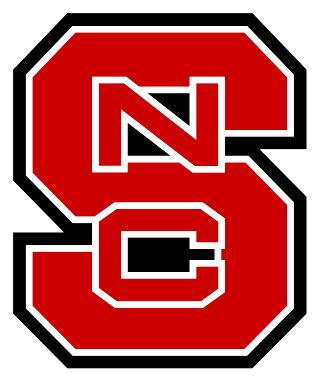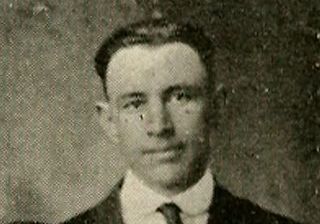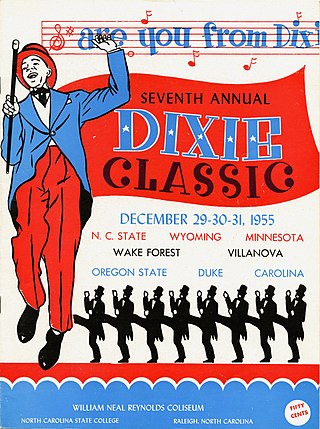
Tobacco Road is a term used in college sports, mainly basketball, for the four rival universities of North Carolina that play in the Atlantic Coast Conference (ACC). The term refers to the area's history as a major tobacco producer. The Tobacco Road teams represent the following universities:

Everett Norris Case, nicknamed the "Old Gray Fox", was a basketball coach most notable for his tenure at North Carolina State University, from 1946 to 1964.

William Neal Reynolds Coliseum is a multi-purpose arena located in Raleigh, North Carolina, United States, on the campus of North Carolina State University. The arena was built to host a variety of events, including agricultural expositions and NC State basketball games. It is now home to all services of ROTC and several Wolfpack teams, including women's basketball, women's volleyball, women's gymnastics, and men's wrestling. The university named the court in Reynolds "Kay Yow Court" on February 16, 2007, with the assistance of a substantial donation from the Wolfpack Club. That same night, the Wolfpack women upset #2 North Carolina, just two weeks after the men upset #3 North Carolina at the PNC Arena.
Matthew Francis Doherty is an American former college basketball coach best known for his time as head coach of the University of North Carolina Tar Heels men's basketball team. Prior to accepting the head coaching position at UNC he spent one season as head coach of the University of Notre Dame Fighting Irish men's basketball program.

The Duke–North Carolina rivalry refers to the sports rivalry between the Duke University Blue Devils and the University of North Carolina Tar Heels, particularly in the sport of basketball. It is considered one of the most intense rivalries in all of US sports; a poll conducted by ESPN in 2000 ranked the basketball rivalry as the third greatest North American sports rivalry, and Sports Illustrated on Campus named it the #1 "Hottest Rivalry" in college basketball and the #2 rivalry overall in its November 18, 2003 issue. The intensity of the rivalry is augmented for many reasons. One reason is the proximity of the two universities—they are located only ten miles apart along U.S. Highway 15–501 or eight miles apart in straight-line distance. In addition, Duke is a private university whereas Carolina is a public school; the vastly different funding structures and cultures between the two further contribute to the intensity of the rivalry. One of the biggest reasons for this rivalry lies in the success of their respective basketball programs; almost every year, at least one of the schools is a contender to win the national championship.

The North Carolina–NC State rivalry, also known as the State-Carolina game, Carolina–State Game, North Carolina–NC State game, NCSU–UNC game, and other similar permutations, is an ongoing series of athletic competitions between the University of North Carolina at Chapel Hill Tar Heels and North Carolina State University Wolfpack. The intensity of the game is driven by the universities' similar sizes, the fact the schools are separated by only 25 miles, and the large number of alumni that live within the state's borders. Both are charter members of the Atlantic Coast Conference (ACC) and are part of the Tobacco Road schools. The most popular games between the two are in football, basketball, and baseball.

The NC State Wolfpack men's basketball team represents North Carolina State University in NCAA Division I men's basketball competition. NC State is one of the seven founding members of the Atlantic Coast Conference. Prior to joining the ACC in 1954, the Wolfpack were members of the Southern Conference, where they won seven conference championships. As a member of the ACC, the Wolfpack has won eleven conference championships, as well as two national championships in 1974 and 1983.

The North Carolina Tar Heels Men's basketball program is a college basketball team of the University of North Carolina at Chapel Hill. The Tar Heels have won six NCAA championships in addition to a 1924 Helms Athletic Foundation title (retroactive). North Carolina has won a record 133 NCAA tournament matchups while advancing to 31 Sweet Sixteen berths, a record 21 Final Fours, and 12 title games. It is the only school to have an active streak of reaching the National Championship game for nine straight decades and at least two Final Fours for six straight decades, all while averaging more wins per season played (20.7) than any other program in college basketball. In 2012, ESPN ranked North Carolina No. 1 on its list of the 50 most successful programs of the past fifty years.

Charles Glenn "Chick" Doak coached baseball at North Carolina State University from 1924 to 1939 where he accumulated 145 wins, 131 losses, 6 ties.
The Atlantic Coast Conference is one of the premier college basketball conferences in NCAA Division I. The current ACC champions are the NC State Wolfpack.
The 1961–62 North Carolina Tar Heels men's basketball team was Dean Smith's first as the head coach at North Carolina. The 1961–62 team finished with an 8–9 overall record, despite a young and inexperienced roster. They tied for fourth in the Atlantic Coast Conference with a 7–7 record. Their season ended with a first round loss in the ACC Tournament to South Carolina. This was Dean Smith's only losing season as a head coach at North Carolina.

The North Carolina–Wake Forest rivalry is a series of athletic contests between the University of North Carolina Tar Heels and the Wake Forest University Demon Deacons. The first football game between the two institutions was played in 1888. As a consequence of ACC expansion in the 21st century, the two schools do not play each other annually in football, as they were placed in separate divisions and assigned different opponents for their "protected" cross-division games. North Carolina got rival NC State as their cross-divisional opponent, while Wake Forest got Duke, which allowed the Duke-Wake Forest rivalry to continue.
The Big Four Tournament was an annual college basketball tournament played from 1971 to 1981 in Greensboro, North Carolina. The field consisted of the "Big Four" North Carolina Atlantic Coast Conference schools: NC State Wolfpack, Duke Blue Devils, North Carolina Tar Heels, and Wake Forest Demon Deacons. The four previously participated in the Dixie Classic from 1949–1960.

The 1953 Dixie Classic was a mid-season college basketball tournament held December 28–30, 1953 at NC State's Reynolds Coliseum in Raleigh, North Carolina. It was the fifth iteration of the Dixie Classic and it was part of the 1953–54 NCAA men's basketball season. The Duke Blue Devils won the final, defeating the Navy Midshipmen 98–83.

The 1954 Dixie Classic was a mid-season college basketball tournament held December 27–29, 1954 at NC State's Reynolds Coliseum in Raleigh, North Carolina. It was the sixth iteration of the Dixie Classic and it was part of the 1954–55 NCAA men's basketball season.
The 1949 Dixie Classic was a mid-season college basketball tournament held December 28–30, 1949 at NC State's Reynolds Coliseum in Raleigh, North Carolina. It was the first iteration of the Dixie Classic and it was part of the 1949–50 NCAA men's basketball season.

The 1955 Dixie Classic was a mid-season college basketball tournament held December 29–31, 1955 at NC State's Reynolds Coliseum in Raleigh, North Carolina, United States. It was the seventh iteration of the Dixie Classic and it was part of the 1955–56 NCAA men's basketball season.
The 1956 Dixie Classic was a mid-season college basketball tournament held December 27–29, 1956 at NC State's Reynolds Coliseum in Raleigh, North Carolina. It was the eighth iteration of the Dixie Classic and it was part of the 1956–57 NCAA University Division men's basketball season.
The 1957 Dixie Classic was a mid-season college basketball tournament held December 26–28, 1957 at NC State's Reynolds Coliseum in Raleigh, North Carolina. It was the ninth iteration of the Dixie Classic, and it was part of the 1957–58 NCAA University Division men's basketball season.
The 1950 Dixie Classic was a mid-season college basketball tournament held December 28–30, 1950 at NC State's Reynolds Coliseum in Raleigh, North Carolina. It was the second iteration of the Dixie Classic and it was part of the 1950–51 NCAA men's basketball season.












